
Guests
- Eduardo Galeanoone of Latin America’s most distinguished writers. He is the author of the three-volume Memory of Fire, Open Veins of Latin America, Soccer in Sun and Shadow, Upside Down, The Book of Embraces, We Say No, Voices of Time and Mirrors, among others. His most recent book is called Children of the Days: A Calendar of Human History. He lives in Montevideo, Uruguay.
Part one of this interview aired on the May 8th, 2013 program
Watch part two of our conversation with the celebrated Uruguayan writer Eduardo Galeano, author of the new book, Children of the Days: A Calendar of Human History. Galeano’s classic book, Open Veins of Latin America: Five Centuries of the Pillage of a Continent, made headlines when Venezuelan President Hugo Chávez gave President Obama a copy at the Summit of the Americas in 2009. Since its publication in 1971, Open Veins has sold over a million copies worldwide despite being banned by the military governments in Chile, Argentina and his native country of Uruguay. While in exile after the Uruguayan military junta seized power in a 1973 coup, Galeano began work on his classic trilogy, Memory of Fire, which rewrites five centuries of North and South American history.
AMY GOODMAN: This is Democracy Now!, democracynow.org, The War and Peace Report. I’m Amy Goodman, with Nermeen Shaikh, and our guest is Eduardo Galeano, the great Latin American writer. His latest book is Children of the Days: A Calendar of Human History. Eduardo, you were just telling us a story about being—
EDUARDO GALEANO: Chávez
AMY GOODMAN: —an election observer in Venezuela—
EDUARDO GALEANO: I was talking about Chávez, yes, yes.
AMY GOODMAN: —in the referendum for Hugo Chávez.
EDUARDO GALEANO: And I was a delegate of 200 independent observers and working with the former president of the United States, Jimmy Carter, and Gaviria in representation of the Organization of American States, OEA—we three, working together during some days and nights. And in that transit across people in—who was going to vote for or against Chávez retaining power, in this road I heard something which I will never forget, explanation of everything else. It was a man in a very poor neighborhood in Caracas, and I asked him, “I know this, the vote is secret. But tell me, just personally, will you vote yes or no to Chávez?” “I’ll vote—I shall vote yes, of course. I shall vote yes.” “And how? Why? Why?” “Oh, obviously, it’s clear enough: Now I am no more invisible.”
NERMEEN SHAIKH: And that’s his legacy?
EDUARDO GALEANO: Mm-hmm.
NERMEEN SHAIKH: For people in Venezuela. Do you think people in the region, as well?
EDUARDO GALEANO: People in region?
NERMEEN SHAIKH: In Latin America, as well, not just in Venezuela?
EDUARDO GALEANO: Ah, no, not just in Venezuela. Now they are becoming—this is the good part, the best part of the present situation in diverse Latin American countries, in which the invisibles are becoming visibles.
AMY GOODMAN: That’s President Chávez’s legacy. What about President Obama?
EDUARDO GALEANO: Oh, for me, it was great news when I knew that he won the elections the first time, because in this country, I remember that 1942, when the United States entered in the Second World War, the Pentagon forbade, prohibir, forbade the transfusion of black blood. In order to avoid that, by injection, will be done, but it was prohibited in the beds. And so, the president of the Red Cross in the States was a very important scientist. He was black. And he said, “I won’t obey this order of the Pentagon, because it’s a stupid order, for the simple fact that black blood does not exist. All bloods are red.”
NERMEEN SHAIKH: Eduardo Galeano, you initially wanted to be a soccer player—
EDUARDO GALEANO: Yes.
NERMEEN SHAIKH: —and not a writer.
EDUARDO GALEANO: No.
NERMEEN SHAIKH: Can you talk about the significance of soccer in Latin America and the connection between soccer and politics, or sport and politics?
EDUARDO GALEANO: Yes. Yes, I wanted to be a soccer player, and I became the best of the best, the number one, better than Maradona, better than Pelé, and even better than Messi—but only at night, nighttime, during my dreams. When I wake up, I realized that I have wooden legs and that I’m doomed to be a writer. It’s my only possibility in life, to earn my life honestly, is writing, but not playing football, soccer.
I remember a sports journalists in the States. I met him in Montevideo some years ago, 20 years ago. And I asked him about what is called soccer here. And he said, “Oh, no, no. Yeah, soccer, football in the United States, is the sport of the future, and it will always be.” But he was wrong, because this very good journalist ignored that half of the U.S. population was you, women. And now the United States have the best teams, one of the two or three best team of female football in the world. And this is part of the reality also—or not. You are two to one; you are the majority in this table.
AMY GOODMAN: Can I ask you about your health and about how it has evolved and changed your worldview? I mean, you have struggled with cancer. You had—
EDUARDO GALEANO: Yes, twice, yes.
AMY GOODMAN: —a cancer operation the last time you were here.
EDUARDO GALEANO: Yes.
AMY GOODMAN: A lung cancer. And you’re dealing now.
EDUARDO GALEANO: Yes.
AMY GOODMAN: How is it—how are you coping?
EDUARDO GALEANO: Well, I’m crossing this difficult period, and I realize that I have discovered new remedies that have awful side effects but are curing me. I mean, my tumor is reducing more and more, thanks to these new remedies, which are also sometimes—I feel some of the side effects are brutal. I asked my doctor, “Well, these remedies, [inaudible] by the Pentagon?” “No, no, not at all. But you just accept these side effects because you are going to go on living, and otherwise, you may be dead.” “Oh, no,” I told the doctor. “No, dead, no. Death is so boring. No, please, I’ll try with the remedy.”
NERMEEN SHAIKH: You’ve often quoted Pablo Picasso saying that “art is a lie that tells the truth.”
EDUARDO GALEANO: It’s true.
NERMEEN SHAIKH: So what do you see as the significance of art and of your writing, in particular, its relationship to the truth and to politics?
EDUARDO GALEANO: And to politics and to everything else. For instance, what is a good writer, from my point of view? That was able to make the past become present telling a history of two centuries ago or three centuries or four or I don’t know how much, and the reader may feel it’s happening right here and now. The past turn to be present in the magic words of a good writer. That’s a lie, in the sense that what he or she is telling didn’t—is not happening now, but thanks to these art prodigies, their magic powers, it does occur in today.
I remember that—you know, I didn’t receive a formal education. I was educated in the Montevideo cafe, in the cafes of Montevideo. There, I received my first lessons in the art of telling stories, storytelling. I was very, very young and sat at one table, neighbor of other table of people, old people, or more or less old, and they were telling stories, and I was hearing, because they were very good storytellers, anonymous. And one of them was telling a story about a battlefield at the beginning of the 20th century in Uruguay in a war period in the countryside. He was walking among the killed soldiers of both sides. They were distinguished by a ribbon on the front: the white and the red. And suddenly he found an angel. That was what he said: “I found an angel, with the arms open, laid in the grass.” And a bullet had entered into his head, crossing the white ribbon. But he could read in the—in the white ribbon was a stain, mancha, stain of blood all along it. But something was written there: “For my country, for my countryside.” No, patria? How is it, patria, in English? Country?
AMY GOODMAN: Country, for my country.
EDUARDO GALEANO: “For my country, and for her.” And the bullet had entered in the word “her.” And so, I felt I was looking at that man who had died 50 years ago or 60 years ago. So this was a lie, but a lie telling the truth. This was art, an art done by an anonymous person and with no pretensions of being, you know, selected, elected by the finger of God.
AMY GOODMAN: Eduardo—
EDUARDO GALEANO: There are some writers who feel they are elected by God. I am not. I am elected by the devil, this is clear.
AMY GOODMAN: I wanted to ask you about the power of silence, as you talk about words. You were born in Uruguay. You left at the time of the coup. You were imprisoned briefly?
EDUARDO GALEANO: Sí, briefly.
AMY GOODMAN: Why did they imprison you briefly?
EDUARDO GALEANO: I never know, never knew. Everybody was imprisoned, even if you feel or you were, you know, practically free. But it—and it was an entire country in prison. And Uruguay was at that time world champion of torture. Everybody was tortured. I wasn’t. I was lucky enough to avoid it. And torture was quite efficient, not in the sense that it’s told by some friends of torture. No, not in this sense. It’s not—never—it’s almost never useful to get information. And the purpose of torture is not getting information. It’s spreading fear. And in this sense, torture was really efficient in Uruguay. It was an entire country sick, enfermo —
AMY GOODMAN: Sick.
EDUARDO GALEANO: —of fear. I remember I received in exile in Barcelona some letters, anonymous letters with no indications of address, of names or nothing, no, of course. And one of the letters said, “It’s terrible, learn to lie. But, you know, we had no choice. We’re obliged to lie, day and night lying. And it’s horrible. But worse than learning to lie is teaching to lie. And I have three children.”
AMY GOODMAN: Three children?
EDUARDO GALEANO: That was what the letter said. “Worse than learning to lie was teaching to lie. And I have three children.”
AMY GOODMAN: On the issue of silence, you went from Uruguay to Argentina. And there, the torture, the repression was intense.
EDUARDO GALEANO: Yes, yes.
AMY GOODMAN: You were editor of a magazine, and you answered the censorship with silence. Explain.
EDUARDO GALEANO: Yes. Yes, finally, I fled away from Argentina also, because—I couldn’t stay in Uruguay, because I don’t like to be in jail, and I didn’t stay in Argentina. I could not, because I didn’t want to lay in a cemetery, because, as I told you before, death is very boring.
NERMEEN SHAIKH: You’ve said that a lot of your work—I mean, it’s obvious from even what you’ve read—a lot of your work is about reclaiming different histories, not only in Latin America, but also in Latin America, to overcome what you’ve called the problem of amnesia. Could you elaborate on what you mean by that?
EDUARDO GALEANO: Amnesia?
NERMEEN SHAIKH: Yes.
EDUARDO GALEANO: Well, we have a memory cut in pieces. And I write trying to recover our real memory, the memory of humankind, what I call the human rainbow, which is much more colorful and beautiful than the other one, the other rainbow. But the human rainbow had been mutilated by machismo, racism, militarism and a lot of other isms, who have been terribly killing our greatness, our possible greatness, our possible beauty.

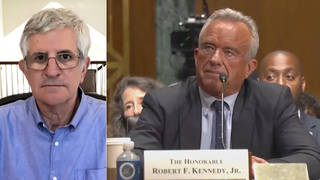
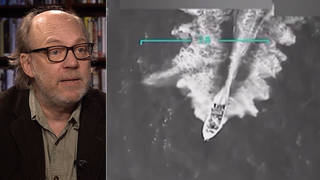
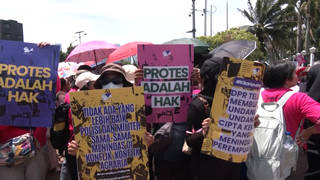
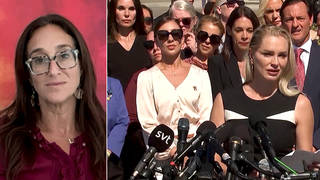





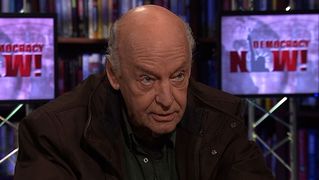
Media Options